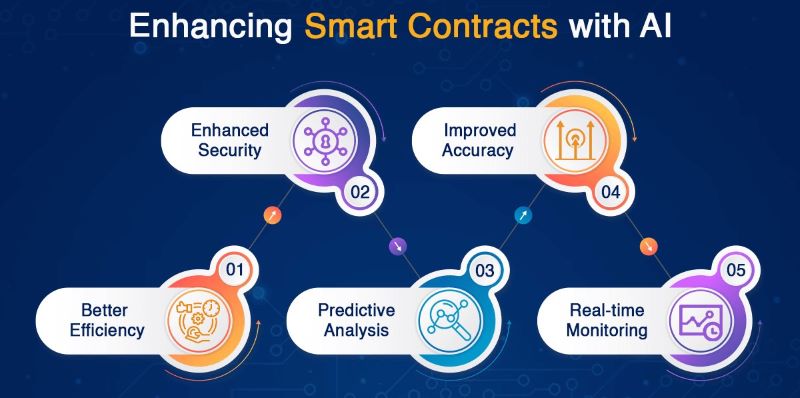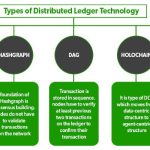Imagine cutting through red tape with a click, making deals you can always trust. That’s what blockchain smart contracts do. They’re a game-changer for sectors far and wide. We’re not just talking hype here; we’ve got real-life blockchain smart contracts use cases that show how these digital agreements are reshaping the way we handle business in finance, insurance, healthcare, and more. I’ll take you on a deep dive into how they embed trust in banking, overhaul the tedious insurance claims process, and even how they make waves in the supply chain and energy world. This isn’t the future; it’s happening right now, and you’ll see how smart contracts shake things up in ways we once only dreamed of. Buckle up; this ride through innovation is one you won’t want to miss.
Embedding Trust in Finance with Smart Contracts
Transforming Traditional Banking through Decentralized Agreements
Banking used to be all about the big buildings and long waits. Not anymore! Now, we have smart contract applications that are changing the game. They are like superhero rules for money – they make sure everyone plays fair. With these smart contracts, you don’t have to trust people; you trust the code.
What are decentralized agreements? They’re deals that run on a system of many computers, not just one. This way, no single person has all the control. It’s like having a bunch of referees at a soccer game, making sure everything is okay. It’s super safe because messing with a single computer won’t change the rules; you’d have to mess with most of them, and that’s really hard to do.

Ethereum contracts take this to the next level. Ethereum is like a big digital fairground where these contract rules live. If you shake hands on a deal here, the Ethereum makes sure you both do what you promised. Self-executing contracts are the muscle behind this; they do what they need to do without anyone telling them.
Real-world smart contract examples? There are lots! Do you know loans can now happen without a middleman, thanks to this tech? Or we can manage our money together without meeting face-to-face.
Innovations in Cross-border Payments and Automated Loan Agreements
Cross-border payments were really slow and costly. But with blockchain in finance, we make them fast and cheap. Imagine sending money as easy as sending a text message! That’s what blockchain allows you to do, even if you’re sending it half-way across the world.
Automated loan agreements are rad too. Before, getting a loan meant paperwork and waiting. Now, it can happen in minutes! Smart contracts check if you’re good for the loan and, zap! You’ve got the money without fuss, and it’s all safe and tight.
All in all, finance is becoming a trusty place with smart contracts. We now have real superpowers with just a tap on our screens, all thanks to blockchain.
Reinventing Insurance and Healthcare Through Blockchain
Streamlining Claims with Insurance Smart Contract Cases
Picture this: you get into a fender bender. Normally, you’d wait weeks for your insurance claim. But with blockchain’s smart contract applications, you get paid fast. No hassle. No stress. In insurance, these tech wonders use data to trigger payouts. Your claim process feels like magic, but it’s smart legal contracts at work.
These are self-executing contracts. They check claims against data and then, like clockwork, they send money to those in need. People call this an insurance smart contract case. It’s a fresh, bold way to solve old pains. And it’s all thanks to the power of Ethereum contracts embedded in blockchain for digital contracts.
Insurance gets clear and fair. Paperwork vanishes. And the best part? Trust grows. Companies show they keep their word. People know they’re covered. Everyone’s happy, and it’s all because of this clever tech that makes sure you’re never left waiting.
Enhancing Patient Data Management with Healthcare Smart Contracts
Now, let’s jump into healthcare. Imagine your medical records are safe and easy to share. But only with the right people. That’s healthcare smart contracts for you. They guard your health info like a treasure. And only unlock it when truly needed.
Doctors see your history in a snap. They make better choices for your care. You feel safe, knowing your secrets stay secret. All this is possible with decentralized agreements that use blockchain in finance and health.
Say goodbye to files lost in moves. Wave off fears of stolen identity. These digital tools—the smart contracts—keep your personal health story in lock and key. And only those you trust can peek inside.
Blockchain isn’t just for computer folks. It’s for doctors working to heal, and insurance pros striving to help. It clears the fog in claims, and it puts you in control of your health data. Soon, it’ll be everywhere, and we’ll wonder how we ever managed without it.
Every clinic, every insurer— they’ll get why this isn’t just smart, it’s vital. It’s like a friend who always looks out for you, day or night. And it doesn’t rest until things are right. This is the future, brought to you by those of us who see beyond, and it’s a future I can’t wait to fully unfold.
Revolutionizing the Supply Chain and Energy Sectors
Tracking Goods with Smart Contracts in Supply Chain
Smart contracts change how we track items we buy every day. They make each step clear to see. When someone sends an apple box from a farm, smart contracts note it. They track the box as it moves from trucks to stores. Each step gets saved on blockchain. It’s like a game where each player’s move is open for all to see. This stops mistakes and lies. There’s trust because no one can mess with the data. It’s safe and fixed.
Now, how does blockchain do this? Understand it as a digital helper. It’s always watching. The smart contract acts when goods move as planned. It also warns us if things go wrong. Let’s say our apple box is late. The smart contract sees it. It can then tell the store and the farmer at once. This stops trouble before it grows. Everyone knows what’s happening. It’s not just talk. There’s proof. It’s like a friend you trust to never lie about where they are or what they do.
Facilitating Green Energy with P2P Energy Trading Contracts
Green energy is big today. We all want cleaner power. But how do we sell and buy it right? Here’s where P2P energy trading steps in. P2P means person-to-person. It’s you dealing straight with someone else. No need for a big company in between. Smart contracts run the trade. They work on rules set before. These rules make sure every watt of power goes where it should. And that everyone pays or gets money right on time. It’s fair and square.
Now picture this. You have solar panels on your roof. They make more power than you need. A smart contract lets you sell this extra power to your neighbor. Easy and direct. No fuss. Both of you trust the deal because blockchain’s smart contracts are like a referee. They don’t take sides. They just follow the rules. It keeps things smooth.

Smart contracts keep records of all trades. This means good tracking and less waste. The process is transparent. If issues come up, they’re easy to find. And they’re easy to fix. With old systems, this was hard. It took lots of time and often led to fights. But with smart contracts, it’s like having a map that shows you every step.
So there, smart contracts in supply chains and energy mark big moves. They cut out mistakes and bring trust. Industries thrive as work gets simpler. And it’s all thanks to blockchain! We’re just scratching the surface of what this tech can do. In the future, look for it to change even more ways we do business. It’s a real game-changer, nothing less.
Smart Legal Contracts: Navigating Real Estate and Intellectual Property
Automating Transactions in Real Estate Smart Contract Applications
Real estate often means dealing with lots of paper. People get lost in it. It’s hard. It’s slow. Yet, smart legal contracts turn this around. Imagine selling a house. Normally, it’s a mess. Papers go back and forth. Meetings pile up. Errors happen. It’s a headache. But, throw blockchain for digital contracts into the mix, and you get a game-changer.
Here’s a real-world smart contract example. You list your home. A buyer likes it. They pay in digital cash. The blockchain confirms it. The house deed auto-switches to their name. Just like that. No mess. No error. Super fast. It’s why real estate smart contract applications are on the rise. They use self-executing contracts to cut the chaos. They save you time and stress.
With Ethereum contracts, you can even put in conditions. Say you only sell if the buyer pays by date X. The contract knows. No pay by then? No deal. The system auto-cancels. You keep your house. The buyer keeps their cash. Fair and square.
Securing Creative Works with Intellectual Property Management Blockchain
Creativity sparks joy. It gives us the songs we love, stories we share, and art we cherish. But artists struggle. How can they prove they made something? How do they stop others from stealing their work? How do they get paid properly? Enter blockchain.
Using smart contracts for royalties is smart. A musician drops a new song. They use a contract. It records their ownership. No doubt who made it. Then, it tracks every download or play. The artist gets their share. No middleman. No delay. It’s direct. It’s in their pocket. This is blockchain in the music industry—a win for artists!
Filmmakers, writers, even coders, benefit too. Intellectual property management blockchain maintains proof. It’s tough to forge. Tough to break. It guards their creations. And it’s all thanks to decentralized agreements. These bits of code on the blockchain that make sure deals stay firm.
But wait, it’s not just about protection. It’s about partnership too. Imagine a movie. Many hands make it real. Actors, directors, writers. They all need their fair cut. Smart contracts sort this. The movie makes millions? They see their share. Automatically. As agreed. No missing out. No hard feelings. It’s clear. It’s settled. Peace of mind for all.
Smart contracts shape our world with every click. They’re not just tech talk. They’re our ticket to simpler, safer, smarter deals. They bridge gaps. They protect work. They hand power back to people. Trust me on this; I know the ropes. Harnessing technology in contract law is the smart move—and it’s just getting started.
We’ve explored how smart contracts are changing finance, healthcare, insurance, supply chains, energy, real estate, and intellectual property. We saw how they make banking fair and fast, improve how we send money across borders, and make loans simple. They help manage health data better and make dealing with insurance claims less of a headache. Goods we buy are tracked easier, and buying clean energy is now smarter. They even make buying homes easier and protect ideas and art.
I believe smart contracts are a game-changer. They make things we do every day easier and safer. They use tech to fix old problems in new ways. As an expert, I see heaps of potential in using them more as we move forward. Let’s embrace this change and see where it takes us!
Q&A :
What are the Top Industries Benefiting from Blockchain Smart Contracts?
Smart contracts on blockchain technology are transforming various industries by streamlining processes and enhancing security. Some top sectors seeing significant benefits include finance, for automating payments and settlements, real estate, by simplifying property transactions, and supply chain management, where smart contracts provide transparent and tamper-proof tracking of goods.
How are Smart Contracts Revolutionizing the Healthcare Industry?
Blockchain smart contracts are set to revolutionize healthcare by ensuring the integrity of data, enhancing patient privacy, and facilitating secure and instant sharing of medical records among authorized parties. They are also anticipated to play a critical role in pharmaceutical supply chains and in automating insurance claims processing, thereby reducing fraud and improving efficiency.
Can Smart Contracts be Used in Government Operations?
Indeed, smart contracts have immense potential in government operations. They can be utilized to upgrade the transparency of governmental transactions, automate public records management, streamline tax collection processes, and secure the integrity of electoral systems. This technology is earmarked to enhance public trust and significantly cut down on bureaucracy and corruption.
What Role Do Smart Contracts Play in the Energy Sector?
In the energy sector, smart contracts facilitate peer-to-peer energy trading, allowing households with renewable energy resources like solar panels to sell excess energy directly to other consumers without intermediaries. They are also vital for automating and accurately executing energy derivatives trading and for the management of smart grids.
Are Smart Contracts Viable for Intellectual Property and Royalty Management?
Smart contracts provide an efficient and transparent mechanism for managing intellectual properties and royalties. They can automate royalty payments, ensuring creators and rights holders are fairly compensated promptly. Additionally, smart contracts can manage licenses and reduce the potential for intellectual property disputes by clearly recording ownership and usage rights.


